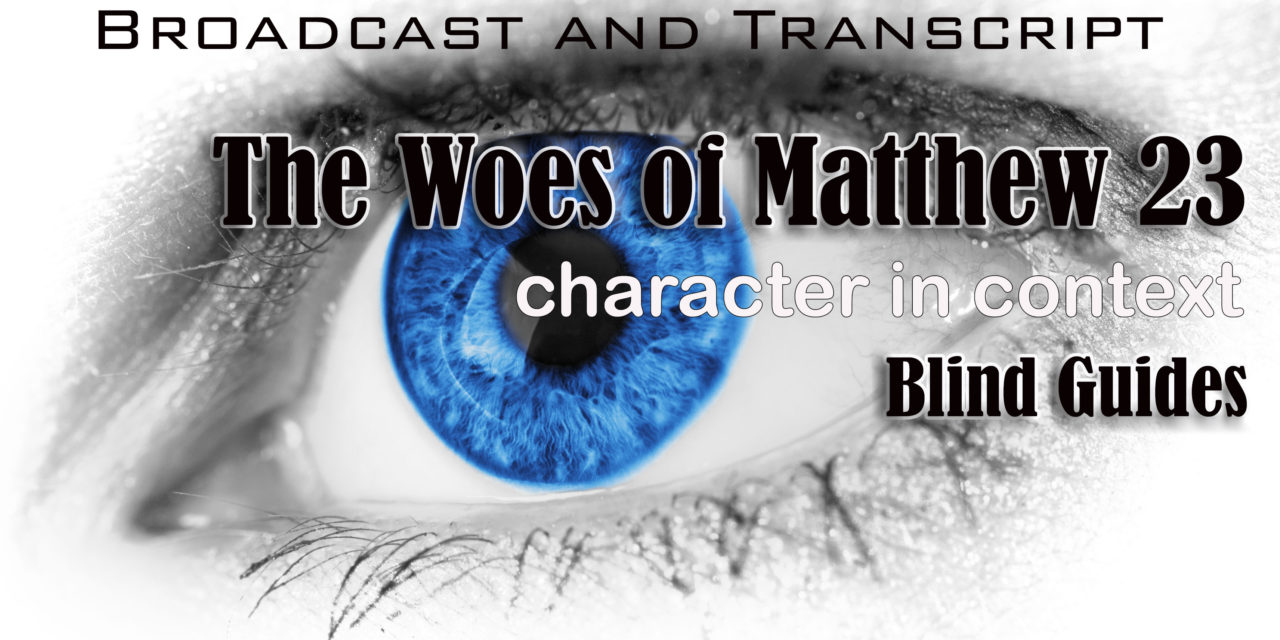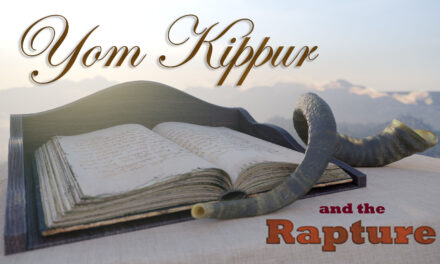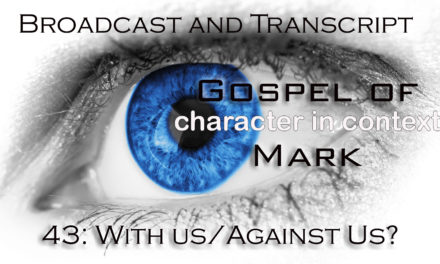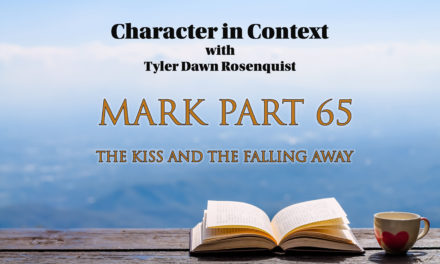Continuing with my series on the “woes” of Matthew 23. So did you know that, according to the Pharisees’ oath rules, you could swear not to eat anything, but eat a tarantula without having broken your oath?
This week we are going to delve into Mishnah Tractates Shevuot and Nedarim in order to figure out why Yeshua/Jesus was forbidding oaths, as were other Jewish factions in the first century, when they are commanded and used throughout the Hebrew Scriptures. What was going on here? And why did Yeshua label them as blind not once, but three times in this particular rebuke?
Here is a very loosely edited transcript, so don’t expect it to be perfect.
********************
Matthew 5 33 “Again you have heard that it was said to those of old, ‘You shall not swear falsely, but shall perform to the Lord what you have sworn.’ 34 But I say to you, Do not take an oath at all, either by heaven, for it is the throne of God, 35 or by the earth, for it is his footstool, or by Jerusalem, for it is the city of the great King. 36 And do not take an oath by your head, for you cannot make one hair white or black. 37 Let what you say be simply ‘Yes’ or ‘No’; anything more than this comes from evil (ESV)
This week we are going to be talking about one of the most maddening pieces of Bible context that I have ever studied, namely, the frustrating oath rules of the first-century (and later) Pharisees. Studying this over the past few weeks has really left me wanting to pull my hair out.
Hi, I’m Tyler Dawn Rosenquist and welcome to Character in Context, where we explore the historical context of Scripture and talk about how it bears on our own behavior and witness as image-bearers. You can find my teachings on my websites theancientbridge.com and contextforkids.com as well as on my youtube channels, accessible from my websites. You can also access past broadcasts on my podcast channel characterincontext.podbean.com and my context books for adults and families are available through amazon.com.
So this is our fourth teaching in a series on the “woes” of Matthew 23. This week we are going to address the third woe—Yeshua’s/Jesus’s charge of hypocrisy directed at the Pharisees for their convoluted rules for which spoken oaths do and do not count. You might ask, “Whoa there, how can you take an oath and not have it count?” Good question, and it is at the heart of the charges leveled at the Pharisees in this week’s teaching.
Now, the scripture I read at the beginning, of course, is not from the woes, but from the beatitudes, but they do help to illuminate what Yeshua was addressing in the woes, which we will read in a little bit here. But first, I quickly want to review the purpose of the woes if you haven’t tuned in to any of the previous teachings.
in the ancient Greco-Roman world, which the first century Jews found themselves a part of, a very popular form of debate between rival philosophies or schools of thought was polemic. Polemic is essentially a Hellenistic form of literary insult. You level charges of hypocrisy against philosophical rivals in order to dissuade anyone from listening to or following them, so that they will follow you instead. It was fairly scripted, and the charges were usually fairly uniform—wanting to make your rival look like unseemly influences on the youth and dangerous to society and not practicing what they preach. Throughout the Gospels, we see the Pharisees launching into polemic attacks on Yeshua—saying that he has a demon and cavorts with sinners, that his interpretations of Torah are dangerous, etc. The whole purpose was to get your rivals assigned to a deviant status on the outskirts of society, and your own philosophy mainstreamed. In other words, you want to get everyone to listen to you and no one to listen to them. Yeshua used this recognized form of debate in order to undermine the Pharisees’ status as the people’s champions, as their go-to interpreters of Torah. Yeshua is effectively saying that He is the one true interpreter, the only interpreter, of Torah. And of course, He’s right—He’s the only one ever born who could make that claim and He was doing it in terms that His audience would understand. Of course, we can’t say the same thing because we’re all wrong about a whole lot of stuff and we don’t even know it. Not Him. Yeshua and John the Baptist were in a class all their own in the first century with their unique callings, and we see the Pharisees, Scribes, Herodians, Chief Priests, Elders and Sadducees using their influence in order to keep the am ha’aretz away from their Savior. But now Yeshua has entered into Jerusalem, their territory, for His final Passover and it is time for a showdown. He is about to be crucified, and it is an all or nothing plea for the hearts and minds of the Jewish people in Judea—because He had already won over the Galileans.
He is going to use every tool in the first-century arsenal—polemic, hyperbole (exaggeration), stereotyping (by addressing the Pharisees and Scribes as a group without making exceptions), and He is going to do it not with the casual, vague, and typical insults of the day, but He is going to use their own doctrines against them as ammunition in the battle for the people He has come to save. We have to remember how influential and beloved the Pharisees were, according to Josephus who, although he classified them as not practicing what they preached, felt that they had the right interpretations of Torah. And he also said that the people followed their guidance. This means that it was the job of the Pharisees and Scribes to direct the people toward Messiah, but they were leading people away instead. It was the ultimate in hypocrisy and dereliction of duty.
So, last week we talked about their not allowing people to enter into the Kingdom, because they were leading people away from Yeshua, and they weren’t going in themselves, as well as the charge that their converts were even worse than they were. Those were the first two woes. Let’s look at the third woe.
16 “Woe to you, blind guides, who say, ‘If anyone swears by the temple, it is nothing, but if anyone swears by the gold of the temple, he is bound by his oath.’ 17 You blind fools! For which is greater, the gold or the temple that has made the gold sacred? 18 And you say, ‘If anyone swears by the altar, it is nothing, but if anyone swears by the gift that is on the altar, he is bound by his oath.’ 19 You blind men! For which is greater, the gift or the altar that makes the gift sacred? 20 So whoever swears by the altar swears by it and by everything on it. 21 And whoever swears by the temple swears by it and by him who dwells in it. 22 And whoever swears by heaven swears by the throne of God and by him who sits upon it.
So, obviously the Pharisees had laws, which the Scribes were teaching, that invalidated oaths based on their wording. When we read Mishnah tractates Shevuot (oaths) and Nedarim (vows, kinda) we begin to really see the seriousness of the problem. Now, what is the difference between an oath and a vow? An oath is supposed to be a statement where someone swears, using the Name of God or gods, that something is true or false. A vow is a promise that one will do something or not do something concrete. For example,
“I swear by the Name that the testimony I am giving is true.” That’s an oath.
and
“I promise that I will give this offering to the Temple.” That’s a vow.
When the men said that they would not eat or drink until Paul was dead, that was a vow. A vow that didn’t go too well for them, obviously. When the High Priest compelled Yeshua to admit whether or not He was the Son of God, he was requiring an oath from Him. Hope that makes sense.
And oaths should be very straightforward. They were used in ancient times to prove that what someone was saying was true—the proof was in calling on the name of one’s god. You were putting the reputation of your god on the line in saying you were telling the truth, and it was absolutely believed that that god would avenge his or her honor if the person was lying. And people believed in their gods, fervently and completely. There were no actual atheists in the ancient world. They didn’t see science behind the workings of the everyday universe, they saw powerful cosmic entities who were responsible for controlling absolutely everything from the fertility of the womb, to the fertility of the Land, to the weather, to the water, to the sun, etc…and the Romans were so religious that they actually deified virtues like victory, harmony, fidelity, and even abstract concepts like thought. The Jews were actually considered to be atheists not because they saw the world any differently, they didn’t, but because they rejected the Roman gods and had this absurd idea that one God could control everything. The Romans didn’t take such divine hyper-multitasking seriously. Their gods were extremely limited in scope, and yet very treacherous and powerful—and all too willing to take out their wrath on anyone who swore an oath in their name and was lying, or who vowed in their name and didn’t follow through. The swearing of oaths in the ancient world was the glue that held society together, when a god’s reputation was more important to a man than his own—mostly because that god could end not only him but his entire family line if offended.
But still, something crazy happened when Hellenization hit Judaism in the third century BCE. The Torah, which had always served to inform people of what wisdom in judgment and action looked like, began to be turned into a formal law code. That’s not entirely bad, but when you lose track of the wisdom concepts behind the Torah rulings, things can descend quickly into legalism—especially in seeing what one can get away with without offending one’s God. Instead of looking at the commandments concerning oaths as being there in order to ensure that God’s Name is not taken in vain, and we will return to this in a minute, and to ensure that an Israelite’s word is good as gold, they began to play games with what and what did not actually constitute a valid oath, and they also did this with vows as well. Before we get to that, let’s look at the third commandment.
Ex 20:7 “You shall not take the name of the Lord your God in vain, for the Lord will not hold him guiltless who takes his name in vain.” (ESV)
This commandment expressly forbids using the Name of God frivolously in oaths or vows in the language of the ancient Near Eastern world. Yes, we shouldn’t say “G—D—” or “J—C—” or anything that even comes close to disrespecting God or His Messiah, but the meaning in context was all about not using God to cover up for a lie. We don’t say, “I swear to God” and then be untruthful, and we especially don’t do it while saying the Divine Name. That’s the spirit behind the commandment—we don’t use God, and we don’t disrespect Him in any way or make Him a party to our sins.
And so that’s why it is so incredibly disturbing that the Pharisees and Scribes were not only doing that but also making it a part of the actual legal system of Israel—as you can see if you read through Mishnah tractates Nedarim and Shevuot. I read Shevuot and it was absolutely maddening, all of the legalistic little rules and runarounds where a man could flat out say something and not be held accountable based on how he worded what he said. In fact, I have to say that the system was obviously rigged in favor of those who were “in the know” and rigged against the uneducated. This is why I have trouble with so much of the Mishnah—because an educated and crafty person can use it to their advantage against an uneducated and simple person. Not all of it, but certainly sections like this.
For example, in Nedarim, in the Babylonian Gemara commentary 14b, the statement is made that if one vows by the Torah it means nothing but if one vows by the contents of the Torah it is binding. Why would someone even bother to swear by the Torah if it meant nothing? And how can you swear by the Torah, as a whole, without swearing by everything in it? It’s a game!
In tractate Shevuot, according to the Kehati commentary, there are so many different little rules and loopholes that it made me want to pry out my eyeballs with a fork. After reading it through, I literally yelled, “Oh for crying out loud, just let your yes be yes and your no be no.” I finally understood Yeshua’s warning in the Beatitudes.
“Again you have heard that it was said to those of old, ‘You shall not swear falsely, but shall perform to the Lord what you have sworn.’ 34 But I say to you, Do not take an oath at all, either by heaven, for it is the throne of God, 35 or by the earth, for it is his footstool, or by Jerusalem, for it is the city of the great King. 36 And do not take an oath by your head, for you cannot make one hair white or black. 37 Let what you say be simply ‘Yes’ or ‘No’; anything more than this comes from evil (ESV)
So, let’s tie this into some of the things I read in Shevuot, which can be found as a part of the larger Seder Nezikin, meaning “damages”. The entire division is related to civil cases and penalties and damages. Nedarim, concerning vows, is actually located in Seder Nashim, which deals with women’s issues—but then they stick a lot of weird stuff into that Order of the Mishnah—including the Nazirite vow laws, even though it has nothing inherently to do with women at all. And that had absolutely nothing to do with this week’s teaching so let’s just move on…
So, in Shevuot—not to be confused with Shavuot, which means weeks, as opposed to Shevuot, meaning oaths. And yes, without the vowel points they read exactly the same which is why context is important. It was codified, finalized, around 200 CE, so about 170 years after Yeshua complained about the Pharisaic oath rules, and so although we can read this and look for similarities, it would be a mistake to believe that these rules are a true reflection of what was going on at the time. For example, we see nothing in the tractate about oaths involving the Temple or altar or sacrifices as we see in the Bible. Why is that? Simple. They no longer existed and so the oaths spoken of in this tractate are from an almost entirely different culture. Swearing on something that no longer exists would be futile. Sort of like the old joke where a guy swears on the life of his mother when she’s already dead. Same difference. Temple was gone. The altar was gone. Sacrifices were gone. What remained? Torah and the Name of God and all the euphemisms for the Name of God. So we aren’t going to see a lot of the wild stuff Yeshua was rebuking them for—that doesn’t mean they didn’t do it, just that it was irrelevant to the legal code because they couldn’t do it anymore.
According to the tractate, there are four types of oaths. The first is a declaratory oath—like “I swear that I will did or didn’t do such and such.” The second is a vain oath—like “I swear that I saw a pig fly by me the other day when I was sitting on a cloud.” The third is an oath of testimony—like “I swear that I do or do not have evidence concerning this court case.” It’s a legal oath. The fourth is an oath of deposit—and we see quite a few Torah rulings on this, where someone has entrusted something with you and they demand it back and possibly you already returned it, or it was stolen, or whatever, and you need to swear an oath concerning what happened to it. We aren’t really going to talk about that, just wanted to give you an idea of how they broke all that down.
To show you how legalistic all this was, and by legalistic I mean bypassing the spirit of the commandments in order to decide what a person can and cannot get away with, I want to share a few examples.
(1) If a person swore an oath not to eat or drink, and they ate carrion, torn animals (terefah), forbidden insects, or creeping things—he didn’t really violate his oath because those things don’t count as food in the Torah, as they are forbidden. In other words, breaking a commandment made it so they weren’t breaking an oath. (3.4)
(2) Once we get to oaths of testimony is where things get really aggravating. One, women were disqualified as witnesses in most cases, but then that is typical for the laws of the middle ages in general. So we have different instances where a woman’s oath is or is not valid depending on the circumstances. Scripture talks about the asham offering that a person must make if they fail to give testimony when they knew something, but there were all these rules determining who actually was liable. For example, if you had knowledge and lied about it everywhere except for in court, you didn’t have to bring the offering. So, bearing false witness was okay in public and not subject to the offering, but not okay in court. (4.1)
(3) Here is one of my favorites: if a guy comes to you and said, “I adjure you to come and testify for me that so-and-so has a bailment, loan, stolen object and a lost object of mine” and you say, “I swear that I know of no testimony on your behalf” (in other words, “I have no idea what you are talking about, what stuff?”) and you are lying, then you only have to bring one asham, guilt offering, when it is discovered or when you decide to be honest. IF, on the other hand, you say, “I swear that I do not know that so and so has a bailment, loan, stolen object and a lost object of yours,” and it turns out that you were lying, you have to bring four asham, guilt offerings, because you enumerated each item. If you had only been vague, you got off with only one offering. See how I said the system was rigged based on who knew how to use what sort of language? Both denials are exactly the same sin, except one is more specific. Both denials have the same effect on the person seeking restitution for losses, but one is treated less severely.
(4) Oh, this one is helpful—if you stand up before the congregation, the synagogue, and say to the crowd, “I adjure you that if you are aware of evidence on my behalf, you come and testify for me.” Well, if they refuse then they don’t have to make the offering—they only have to make the offering if you went and spoke to them as individuals. Hardly in the spirit of truth and brotherly love, right? I see some of the reasoning might be to protect someone who actually wasn’t there to hear the request, but this is a blanket acquittal. What does Lev 5:1 say?
“And if a soul sin, and hear the voice of swearing, and is a witness, whether he hath seen or known of it; if he do not utter it, then he shall bear his iniquity.”
It doesn’t say anything about legalistically weaseling out of your obligation to testify based entirely on technicalities. This was an obligation of a man before God to do what is right and if he didn’t, to make amends with God. But this is what happened when Hellenism met the Torah. Some of the interpretations were absolutely awesome and needed, but then some were just ridiculous, which is what Yeshua was addressing.
(5) Swearing by the Name. (Kehati Shevuot 4.13 pg. 60) Loopholes, if you swore by Heaven and by the earth, no asham offering. What it really boiled down to was that you had to know enough about the Mishnah law to know whether or not you could trust what a person was saying to you, and that is not supported by the Torah. No, nothing in the Mishnah says that the lying is okay, only whether you will or will not endure a penalty for what you said or did or didn’t say or didn’t do. The clever had less reason to fear penalties than the simple. It should not be that way.
James 5:12 But above all, my brothers, do not swear, either by heaven or by earth or by any other oath, but let your “yes” be yes and your “no” be no, so that you may not fall under condemnation.
James is addressing here exactly what we saw in my last example, don’t swear by heaven or by the earth, but he was also telling people not to swear by any oath because the practice was widely discouraged in Greco-Roman times. The Damascus Document and the Temple Scroll both cover the problematic nature of oaths during these times, because they had fallen into such abuse. According to Josephus, the Essenes actually went so far as to forbid oaths almost altogether.
Yeshua addressed the following examples: (1) swearing by Heaven, (2) swearing by earth, (3) swearing by Jerusalem, (4) swearing by one’s head, (5) swearing by the Temple, (6) swearing by the gold in the Temple, (7) swearing by the altar, and (8) swearing by the gift (sacrifice) on the altar.
Yeshua points out that all of these things belong to God. Heaven is His throne, the earth is His footstool, Jerusalem is His great city, He has control over every hair on our heads. He rebuked the Pharisees and Scribes for giving people an out on their oaths if they swore by the Temple but not if they swore by the gold in the Temple—when the Temple is greater than the gold in it. Without the Temple, it’s just plain old gold. He also criticized them for saying that an oath sworn on the altar was nothing, but an oath sworn by the sacrifice on the altar was binding. But unless the blood of that sacrifice was splashed on the sides of the altar, making it holy, it was nothing but lunch. So why was the gold in the Temple binding, and why was the offering binding? It doesn’t say. Luke 16 says that the Pharisees were lovers of money who scoffed at Yeshua when He said that we can’t serve both God and money. Did they value an oath made by the gold in the Temple because they loved gold more than the Temple? It seems unlikely. Or maybe because they had contributed gold to the Temple, and so it constituted an investment on their part, just as a sacrifice they paid for cost them something. I really can’t say for sure. All I know is that they were blinded to what was and was not important.
And so we get to the charge of blindness, made three times. Yeshua calls them “blind guides” and then “blind fools” and then “blind men.” Given the legal wrangling over what makes an oath (or a vow) legally binding or not when all of our words should just flat out be true showed that they absolutely were blind in this area. And not only that, but they were elevating the wrong things and perjuring themselves while calling on greater things. Their spiritual blindness in this area was just staggering and had become the fodder for conversation in multiple Jewish documents of the era. This is not what you want to be famous for.
But where did they get this idea that it was okay to legalistically twist the Scripture to their own benefit? Where did they get the idea that it was somehow cute in God’s eyes to be clever with the text and have Him be okay with it?
This is a famous story from Bava Metzia 59b. I took it from the William Davidson Talmud online.
And this is known as the oven of akhnai. The Gemara asks: What is the relevance of akhnai, a snake, in this context? Rav Yehuda said that Shmuel said: It is characterized in that manner due to the fact that the Rabbis surrounded it with their statements like this snake, which often forms a coil when at rest, and deemed it impure. The Sages taught: On that day, when they discussed this matter, Rabbi Eliezer answered all possible answers in the world to support his opinion, but the Rabbis did not accept his explanations from him.
After failing to convince the Rabbis logically, Rabbi Eliezer said to them: If the halakha is in accordance with my opinion, this carob tree will prove it. The carob tree was uprooted from its place one hundred cubits, and some say four hundred cubits. The Rabbis said to him: One does not cite halakhic proof from the carob tree. Rabbi Eliezer then said to them: If the halakha is in accordance with my opinion, the stream will prove it. The water in the stream turned backward and began flowing in the opposite direction. They said to him: One does not cite halakhic proof from a stream.
Rabbi Eliezer then said to them: If the halakha is in accordance with my opinion, the walls of the study hall will prove it. The walls of the study hall leaned inward and began to fall. Rabbi Yehoshua scolded the walls and said to them: If Torah scholars are contending with each other in matters of halakha, what is the nature of your involvement in this dispute? The Gemara relates: The walls did not fall because of the deference due Rabbi Yehoshua, but they did not straighten because of the deference due Rabbi Eliezer, and they still remain leaning.
Rabbi Eliezer then said to them: If the halakha is in accordance with my opinion, Heaven will prove it. A Divine Voice emerged from Heaven and said: Why are you differing with Rabbi Eliezer, as the halakha is in accordance with his opinion in every place that he expresses an opinion?
Rabbi Yehoshua stood on his feet and said: It is written: “It is not in heaven” (Deuteronomy 30:12). The Gemara asks: What is the relevance of the phrase “It is not in heaven” in this context? Rabbi Yirmeya says: Since the Torah was already given at Mount Sinai, we do not regard a Divine Voice, as You already wrote at Mount Sinai, in the Torah: “After a majority to incline” (Exodus 23:2). Since the majority of Rabbis disagreed with Rabbi Eliezer’s opinion, the halakha is not ruled in accordance with his opinion. The Gemara relates: Years after, Rabbi Natan encountered Elijah the prophet and said to him: What did the Holy One, Blessed be He, do at that time, when Rabbi Yehoshua issued his declaration? Elijah said to him: The Holy One, Blessed be He, smiled and said: My children have triumphed over Me; My children have triumphed over Me.





















